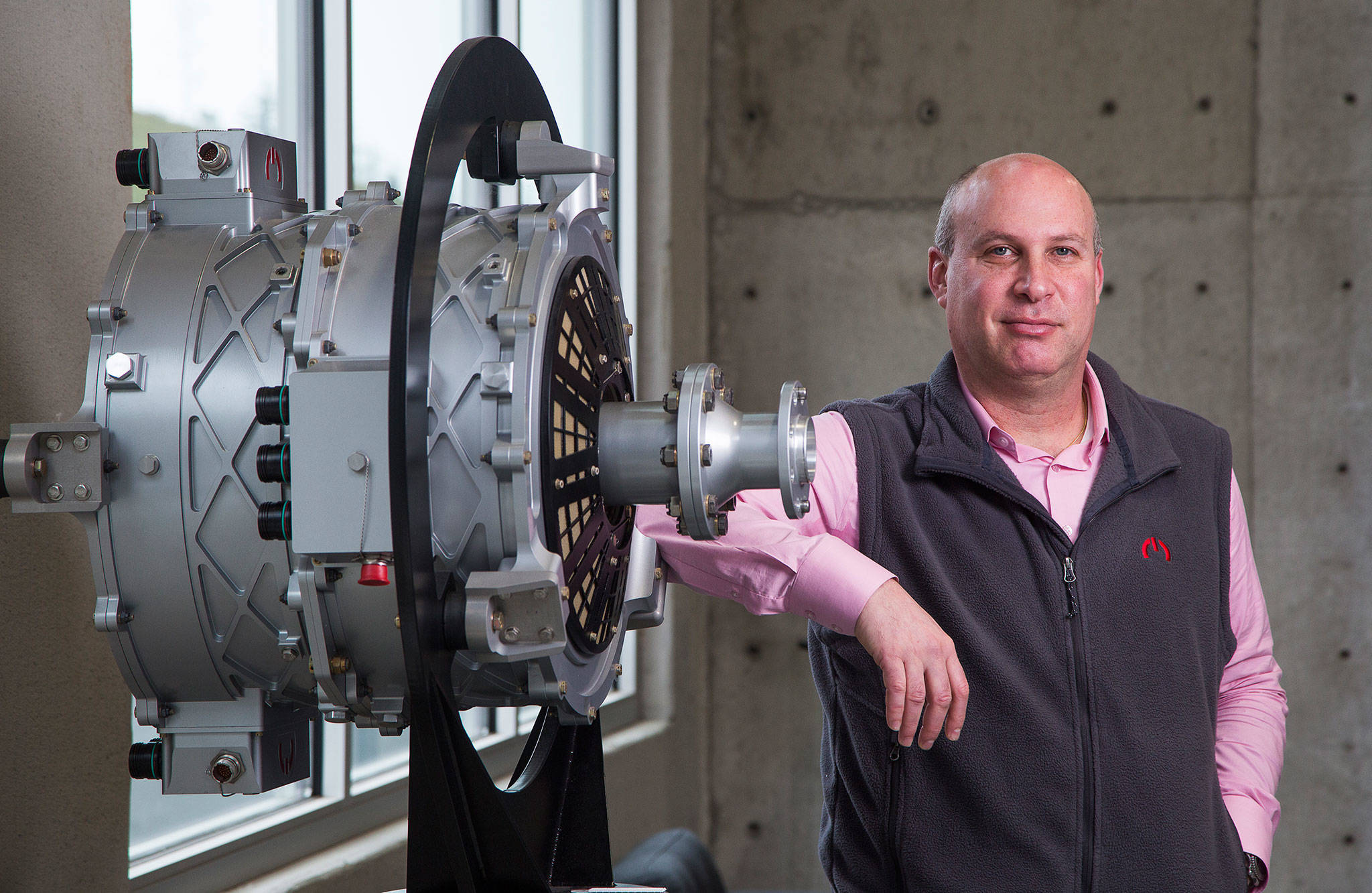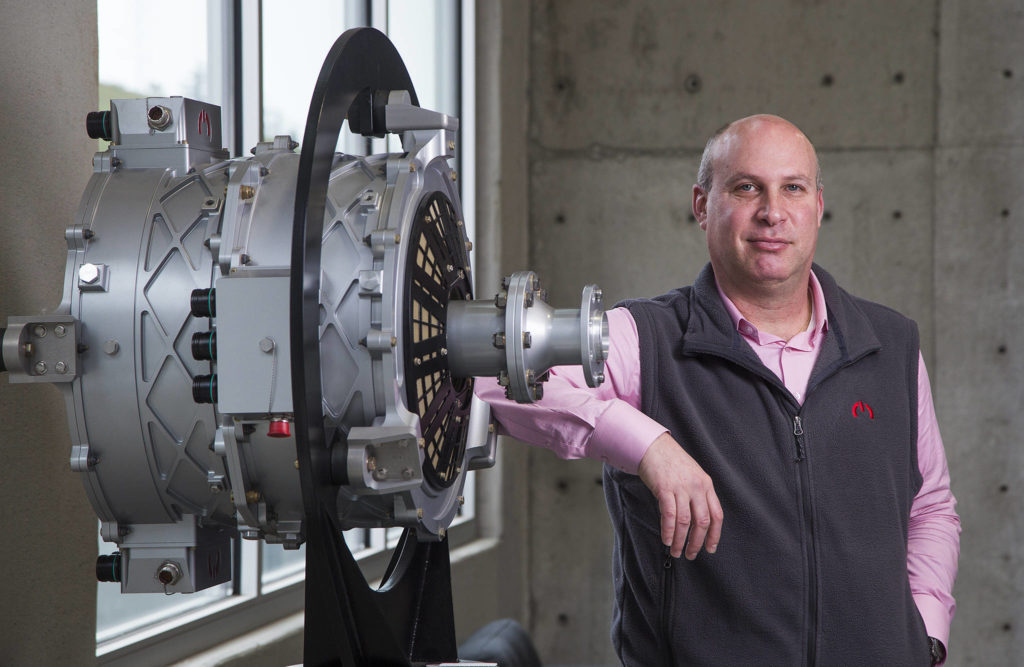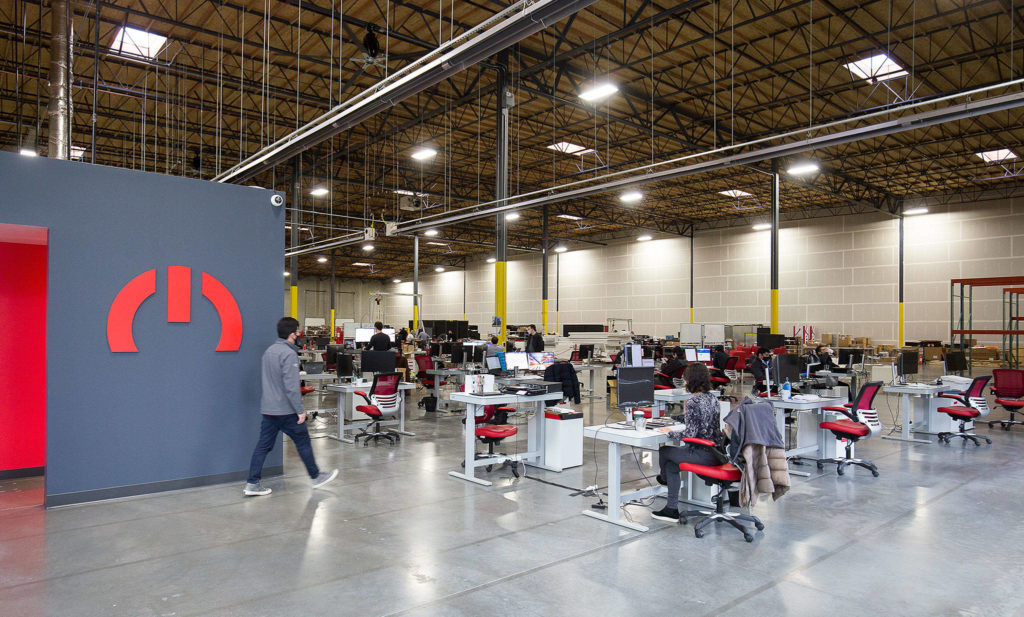EVERETT — Snohomish County’s airspace is beginning to hum — ever so quietly — with new electricity.
Two aerospace companies, both working to develop fully electric aircraft, have moved in.
The county could become the center of aviation’s next electrifying advance.
magniX, which is building electric motors to power aircraft, has consolidated its Redmond headquarters and a research facility in Australia under one roof, a 44,000-square-foot building near Paine Field.
The new Everett location on Seaway Boulevard will serve as the company’s headquarters and as a facility for design, engineering and manufacturing, said Roei Ganzarski, CEO of magniX.
In Arlington, Eviation is building a nine-passenger commuter airplane from scratch. It’s specifically designed around magniX’s electric propulsion system.
The two companies are working together. Ganzarski is Eviation’s chairman of the board.
“This is a very aero-centric county,” said Ganzarski from inside the company’s new Everett headquarters, painted charcoal and red to match the company’s flying “m” logo.
“Boeing is here, new college graduates are here, our suppliers are here. This location gives us space to grow.”
magniX is investing $2.8 million in the new location and plans to boost its employee roster from 50 to 70.
“We are thrilled they have chosen Washington as their initial manufacturing location,” said Lisa Brown, director of the state Department of Commerce.
Boeing’s massive assembly factory and the roar of jet-fueled engines are just down the road.
It’s a comforting backdrop for an aerospace company, but magniX is focused on developing electric propulsion systems for shorter-range commuter flights of less than 500 miles and small, commercial aircraft that carry 10, 12 or 20 passengers.
That’s a potentially lucrative niche considering that 45% of all scheduled commercial flights are 500 miles or less, according to OAG, an aviation and travel data firm.
“We’re talking about a 225-mile flight from Everett to Spokane, or a 250-mile flight from Seattle to Pullman,” said Ganzarski, who often drives to Pullman to visit his daughter because spur-of-the-moment scheduled flights can cost a bundle.
As for large passenger jets becoming plug-ins, it will be decades before you’ll fly a fully electric airplane from Seattle to New York, Ganzarski said.
“It will be 30 or 40 years before that happens.”
State incentive
magniX received $350,000 from the governor’s Strategic Reserve Fund to help with the move. The incentive program is competitive and can be used for workforce development, technical or planning assistance, or relocation assistance. The governor has the final say on the funds’ distribution.
Gov. Jay Inslee gave magniX the OK.
“Washington’s aerospace sector continues to attract some of the most innovative companies in the world,” Inslee said in a statement. “magniX is moving the industry into the clean energy future, and we’re looking forward to watching them succeed and grow.”
The new headquarters also puts magniX closer to its sister company, Eviation, which recently opened a manufacturing facility in Arlington.
Both companies are subsidiaries of the Clermont Group, a private investment firm based in Singapore.
In Arlington, Eviation is developing an electric commuter airplane that can carry nine passengers and two crew members, with a target range of up 500 miles. Alice — that’s the model’s name — would be powered by three magniX electric motors connected to a lithium battery pack, according to the company’s website.
magniX and Eviation fit neatly into the green technology category.
They are among a growing number of firms, including a score of electric aircraft developers, whose innovations could help reduce the aviation industry’s carbon footprint. The Environmental Protection Agency reports that aviation is responsible for 9% of transportation emissions in the United States and 3% of the nation’s greenhouse gas production.
Reducing carbon emission is a worthy goal, but the company’s number one priority is making a business case for its products and turning a profit, Ganzarski said.
“We’re not an environmentalist company. The reason we’re doing this is because it makes business sense,” Ganzarski said.
Roughly half the cost of operating an airline is related to fuel and engine maintenance, according to data firm OAG.
Using standard aviation fuel, it costs about $300 to $400 an hour to operate a commuter airplane. By comparison, the cost to operate an electric plane is about $20 an hour, the price of a few lattes, Ganzarski said.
First flight possibly in 2021
Fully electric airplanes could begin service in five years or so, Ganzarski said. Eviation is targeting 2021 for Alice’s first test flights, with testing to take place at Arlington Municipal Airport. If all goes as planned, the plane could receive federal certification in 2023, Ganzarski said.
Scheduled commuter flights between, say, Everett and Pullman aren’t now feasible because of sky-high fuel costs, Ganzarski said.
When electric aircraft are all the buzz, expect to see new commuter routes established between cities and towns and rural communities that aren’t currently linked by scheduled, commercial flights, Ganzarski said.
COVID-19 has already boosted the “Zoom town” model, in which people live in suburbs or rural areas and work remotely. Now imagine electric air travel is added to the mix.
More point-to-point direct or charter flights could also free up space at larger airports like Seattle-Tacoma International Airport and reduce the carbon footprint, Ganzarski said. For example, instead of driving from Chehalis to Sea-Tac for a flight to Walla Walla, a traveler could take a flight from the Chehalis-Centralia airport directly to the destination.
magniX, which was founded in 2009, reached a milestone in 2019, when the company partnered with Harbour Air, a commercial seaplane carrier based in Vancouver, British Columbia.
One of Harbour Air’s seaplanes, a six-passenger, single-engine DHC-2 de Havilland Beaver, was retrofitted with a 750-horsepower magniX motor.
On Dec. 10, 2019, the electric-powered seaplane completed a short test flight on the Fraser River in British Columbia.
The event marked the first successful flight of a fully electric, commercial-sized airplane.
“If you noticed when that plane taxied out and took off there were no fumes, no exhaust, no smell — zero emissions,” Ganzarski said afterward.
Snohomish County Executive Dave Somers and Everett Mayor Cassie Franklin welcomed the electric aerospace developer.
“We are very excited that magniX — a cutting-edge, innovative aerospace company — has chosen to make Snohomish County their world headquarters,” Somers said in a statement. “We are the center of the global aerospace industry, and magniX will be working to revolutionize how aircraft are powered.”
Franklin said: “I applaud magniX for its decision to manufacture its revolutionary electric airplane engines in Everett, the world’s premier aerospace manufacturing city.”
Janice Podsada; jpodsada@heraldnet.com; 425-339-3097; Twitter: JanicePods
Talk to us
> Give us your news tips.
> Send us a letter to the editor.
> More Herald contact information.



























